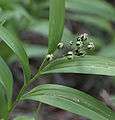Maianthemum stellatum
| Maianthemum stellatum | |
|---|---|
| | |
| M. stellatum in the Wenatchee National Forest, Washington, U.S.A. | |
| Scientific classification | |
| Kingdom: | Plantae |
| Clade: | Angiosperms |
| Clade: | Monocots |
| Order: | Asparagales |
| Family: | Asparagaceae |
| Subfamily: | Nolinoideae |
| Genus: | Maianthemum |
| Species: | M. stellatum |
| Binomial name | |
| Maianthemum stellatum (L.) Link | |
| Synonyms[1][2] | |
|
Synonymy
| |
| Wikimedia Commons has media related to Maianthemum stellatum. |
Maianthemum stellatum (star-flowered, starry, or little false Solomon's seal, or simply false Solomon's seal; star-flowered lily-of-the-valley[3] or starry false lily of the valley;[4] syn. Smilacina stellata) is a species of flowering plant, native across North America generally from Alaska to California to North Carolina to Newfoundland, plus northern Mexico (Sonora, Chihuahua, Coahuila, Nuevo León).[5][6] It has been found in every Canadian province and territory except Nunavut, and from every US state except Hawaii and the states of the Southeast.[7] It is an ever-changing seasonal plant with little white buds in the spring, followed by delicate starry flowers, then green-and-black striped berries (see image gallery) and finally deep red berries in the fall (image gallery).[8][9][10][11][12]
Maianthemum stellatum is a woodland herbaceous perennial plant, smaller than its close relative M. racemosum. For comparison, M. stellatum has smaller, more open inflorescences, flowers with stamens shorter rather than longer than the petals, and somewhat narrower and more curved leaves (image gallery). Both species show the characteristic zigzag of the stem between the alternate leaves.[13] [14] True Solomon's seal (Polygonatum sp) has a similar overall appearance, but the flowers hang from the stem underneath the leaves, rather than forming a terminal cluster.
See also
- Maianthemum racemosum, false Solomon's seal
- Polygonatum commutatum, Solomon's seal
- Polygonatum biflorum, Solomon's seal
References
- ↑ Tropicos
- ↑ The Plant List
- ↑ "BSBI List 2007". Botanical Society of Britain and Ireland. Archived from the original (xls) on 2015-02-25. Retrieved 2014-10-17.
- ↑ "Maianthemum stellatum". Natural Resources Conservation Service PLANTS Database. USDA. Retrieved 2 February 2016.
- ↑ Tropicos, specimen list for Maianthemum stellatum (L.) Link
- ↑ Tropicos, specimen list for Smilacina stellata (L.) Desf.
- ↑ Biota of North America Program 2014 state-level distribution map
- ↑ USDA. "PLANTS Profile: Maianthemum stellatum". Retrieved 2008-03-12.
- ↑ Flora of North America. "Maianthemum stellatum". Retrieved 2008-03-13.
- ↑ Johnson, Derek; Linda Kershaw; Andy Mackinnon; Jim Pojar (1995). Plants of the Western Boreal Forest and Aspen Parkland (Digitized online by Google books). Lone Pine Publishing and the Canadian Forest Service. p. 83. ISBN 1-55105-058-7. Retrieved 2009-01-25.
- ↑ Wilkinson, Kathleen (1999). Wildflowers of Alberta A Guide to Common Wildflowers and Other Herbaceous Plants. Edmonton Alberta: Lone Pine Publishing and University of Alberta. pp. 24–25. ISBN 0-88864-298-9.
- ↑ Kershaw, Linda (2003). Saskatchewan Wayside Wildflowers. Edmonton, Alberta: Lone Pine Publishing. p. 111. ISBN 1-55105-354-3.
- ↑ Horn, Kathleen (1998). Sierra Nevada Wildflowers. Missoula, Montana: Mountain Press. pp. 96=97. ISBN 0-87842-388-5.
- ↑ Laws, John Muir (2006). The Laws Field Guide to the Sierra Nevada (California Academy of Sciences). Berkeley, California: Heyday Books. p. 91. ISBN 978-1-59714-052-2.
External links
- Maianthemum stellatum image gallery
-

M. stellatum painting by Mary Vaux Walcott
-
plant, Washington State
-

plants, Nevada
-

inflorescence, close
-

young striped berries
-
ripe red berries